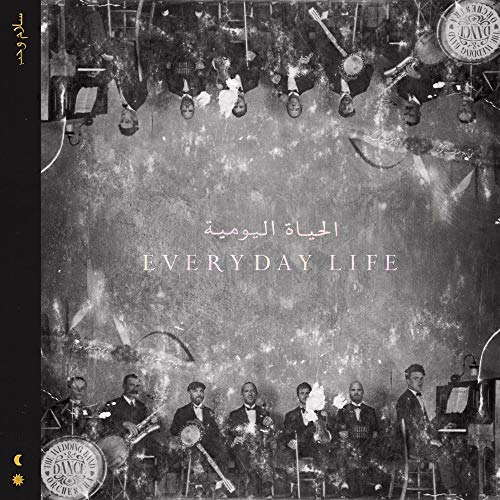
Coldplay
Everyday Life
Release Date: Nov 22, 2019
Genre(s): Pop/Rock, Adult Alternative Pop/Rock, Alternative/Indie Rock, Alternative Pop/Rock
Record label: Atlantic
Music Critic Score
How the Music Critic Score works
Buy Everyday Life from Amazon
Album Review: Everyday Life by Coldplay
Very Good, Based on 11 Critics
Based on rating 4.5/5
It may not be much of a double concept album, but Everyday Life is still the best Coldplay has sounded in over a decade. Coldplay went off the deep end in 2011, throwing all things histrionic against the wall to see what stuck during the confetti explosion that was Mylo Xyloto. Featuring memorable cuts such as 'Paradise', 'Charlie Brown', and 'Princess of China', the peaks were exciting enough to overshadow the album's obvious shortcomings and inconsistencies. The same could not be said of 2015's A Head Full of Dreams, which flaunted a similar level of bombast sans any of the quality content.
Based on rating 8/10
Capping their record-breaking A Head Full of Dreams era in 2018, Coldplay cemented themselves as one of the biggest international acts of the decade. Traversing the globe and selling out stadiums, they absorbed plenty of sounds and stories from fans around the world, which helped inform their experimental Global Citizen EP. That spirit continued to course through the studio, yielding their ambitious 2019 double album, Everyday Life.
Based on rating 8/10
The name Coldplay has become synonymous with a push and pull dichotomy. Over their extensive, and let's be frank, impressive career where they've gone from sad college boys to multi-Glastonbury headliners who can take any stadium and sell it out; the road travelled has been one rife with critique. Eight years ago Coldplay became a band completely entrenched in constructing an immovable fortress of mainstream choruses, after making their name as indie everymen.
Based on rating 7
Listening to the swirling ambience of 'Everyday Life's orchestral, lyric-less two-minute opening track, a listener would never know that a sweeping commentary on seemingly every global issue was to follow. 'Everyday Life' is not an ambient album - as the first track would suggest - but rather Coldplay's own misguided stab at social justice through song, one that aims to change the world with a touchy-feely, white-savior-esque, disingenuous call-to-unity that borders a bit on naivety. Across the 16-song double album, Coldplay cover an impressive amount of thematic ground.
Based on rating 3.5
Next year marks 20 years since Coldplay released their debut album Parachutes. Listening back to it now, it’s a surprisingly small, modest album which ushered in two decades of sold-out arenas around the world, celebrity marriages and ‘conscious uncouplings’ and a fair degree of bile and opprobrium. Back then, as we watched Chris Martin wander across a beach in the Yellow video, they were more likely to be known as the new Travis.
Based on rating 6.8/10
Chris Martin is backstage at Saturday Night Live discussing the Syrian refugee crisis with a group of teenagers. A few feet away, his longtime bandmate Jonny Buckland briefly drowns out the conversation to check his guitar tone, and Martin outstretches an arm to silence him in a somewhat papal display of intraband passive aggression. Buckland mutes his strings; Martin returns to the teens.
Based on rating 6/10
It's been a decade of diminishing returns for Coldplay. Living in the colossal shadow of Viva la Vida or Death and All His Friends, the band spent the last 10 years focusing more on the pop zeitgeist instead of strong songwriting with noticeably substandard results. It came to a nadir with the atrocious, sugary A Head Full of Dreams. Everyday Life course corrects back towards a mix of their experimental tendencies, songwriting craft, and pop sensibilities.
Based on rating 5/10
No matter how blatant Coldplay get with their pop pandering, their sense of self-importance remains undiminished. Their most recent single was a corny EDM crossover with the Chainsmokers — but now they've done a hard pivot and released their mostly wildly pretentious album yet. Everyday Life features Arabic script on its front cover, plus a song called "بنی آد.
Opinion: Great
The Lowdown: When Coldplay announced their new LP, Everyday Life, they mentioned it would be a double album (featuring Sunrise and Sunset), showing a more "experimental" side of the band. And they were right, but not in the way most would have assumed. Perhaps fans were waiting for them to release some genre-bending effort, but that's not what Everyday Life is.
Opinion: Fairly Good
I n the four years since the release of Coldplay's last album, the relentlessly upbeat A Head Full of Dreams, the world has become a more divided place. That sense of unease permeates the band's eighth set - Trouble in Town pontificating on racial politics in the US, even if the chilling sample of police harassment that anchors the powerful second half of the song actually dates from 2013. The excruciating Guns is rather less sure-footed, as Chris Martin - never Bob Dylan when it's come to writing lyrics, in fact barely Noel Gallagher - makes a clumsy pass at satire ("Who needs education, or a thousand splendid suns/ Poor is good for business, cut the forests, they're so dumb"), swears gratuitously and probably sets the liberal cause back decades.
Opinion: Fairly Good
T he internal psychology of rock bands is a tricky thing for outsiders to fathom but, 21 years on from their debut single, it's pretty clear Coldplay are driven by two often conflicting impulses. The first is to be the biggest band in the world, a desire that was evident from the start in their amenable, uncontroversial songs dealing in generalities and emotions expressed so vaguely that anyone could relate to them. This instinct made them impressively adaptable, and when guitar rock's currency crashed, they slipped easily into co-writes with Avicii and pop super-producers Stargate, and arranged guest appearances from Rihanna and the Chainsmokers.
'Everyday Life'
is available now

